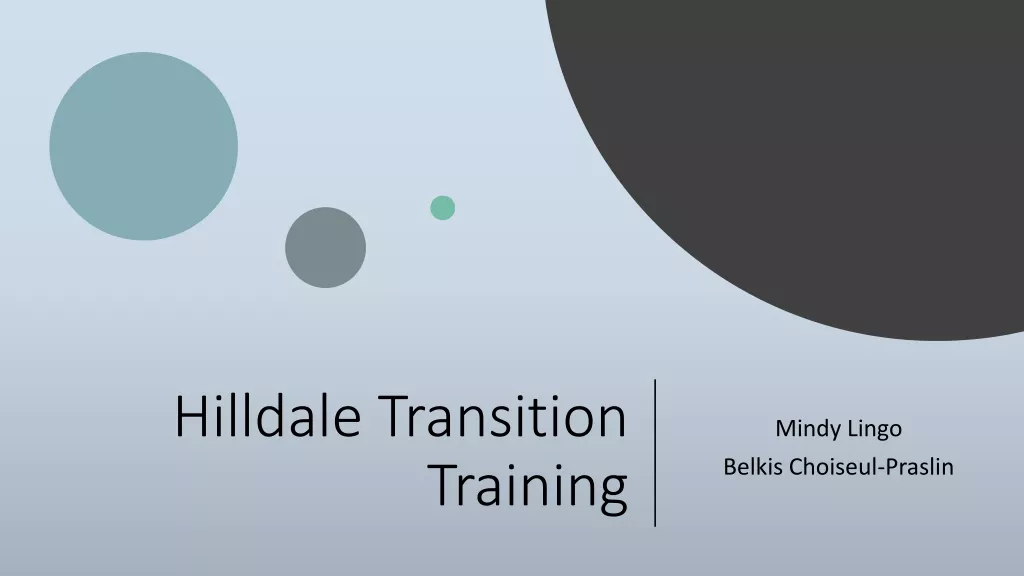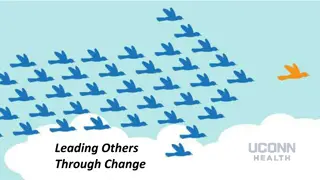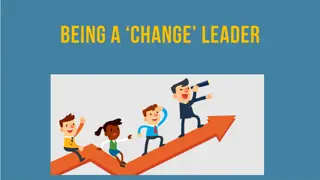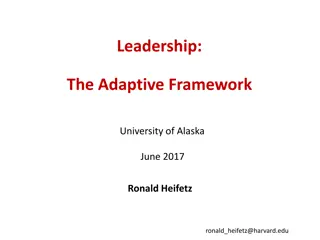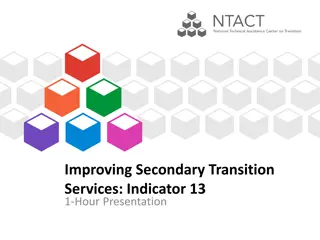Understanding Change and Transition in Leadership by Dr. Jeff Iorg
Explore the nuances of change and transition in leadership through insights from Dr. Jeff Iorg. Learn how managing transitions effectively is crucial, as it involves spiritual, emotional, and psychological adjustments. Discover the importance of focusing on both change and transition, avoiding common leadership mistakes, and guiding people through the grief process associated with losses in the midst of organizational shifts.
Download Presentation

Please find below an Image/Link to download the presentation.
The content on the website is provided AS IS for your information and personal use only. It may not be sold, licensed, or shared on other websites without obtaining consent from the author. Download presentation by click this link. If you encounter any issues during the download, it is possible that the publisher has removed the file from their server.
E N D
Presentation Transcript
Leading Major Change Dr. Jeff Iorg
It s not the changes that do you in, it s the transitions. William Bridges Managing Transitions: Making the Most of Change
Change is Different than Transition Difference between change and transition: Change is the set of new circumstances introduced in an organization. Transition is the spiritual, emotional, and psychological adjustments people go through to accommodate the change.
Change is Different than Transition Common leadership mistake putting too much emphasis on change and not enough on transition. Christian leaders have a spiritual motivation to manage transition well we care about people. Christian leaders see transition as a disciple making process helping people learn and grow.
Change is Different than Transition Three key aspects of managing transition: Transition involves managing grief. Strategy trumps spontaneity. Reluctance does not always equal opposition.
Grief Not Rebellion Change putting people in transition - produces a sense of loss. People respond to loss by going through a grief process. Examples of spiritual loss from change: Loss of ministry expertise. Loss of vacations and discretionary spending. Loss of spiritual confidence. Loss of spiritual heritage.
Grief Not Rebellion Loss is often experienced as grief Stages of grief: shock anger denial bargaining exploration adjustment People process their losses at different rates and in different ways. People may be handling other losses simultaneously.
Grief Not Rebellion Managing organizational grief pastoral care and discipleship. Initiate disciplemaking by teaching, preaching, challenging, and encouraging positive steps of spiritual growth. Initiate pastoral care by: Talking with people pastorally. Sharing information about the grief process. Recognizing grieving people process information poorly. Creating dialogue opportunities.
Grief Not Rebellion Managing organizational grief creating parameters. Create parameters for followers to understand and interpret the change. Create parameters to help minimize anxiety during transition. Establish parameters carefully be trustworthy and follow through on what you promise.
www.gs.edu @Jeff_Iorg
Strategy Not Spontaneity Strategic documents explain the change. Detailed documents can be counterproductive. An entire strategic document should be one to three pages. Challenges to writing a strategic document. It is easier to write longer than shorter. Writing creates permanency and accountability.
Reluctance Not Opposition Insecurity creates false dichotomies and wrong assumptions for leaders internalizing and personalizing opposition. Leaders must allow followers time for: Making a final decision Developing communication avenues Accepting the major change
Reluctance Not Opposition Followers begin their process of acceptance when they hear the change communicated for the first time How long does it take followers to agree with and support a major change recommendation or decision? -A few days to a few weeks Followers want their leaders to succeed and generally want to respond favorably to their leader s initiatives.
Reluctance Not Opposition People who do not accept change. Non-supporters; non-adopters passive people who can be ignored. Resolute opponents cannot be allowed to derail major change since it strikes at the mission.
www.gs.edu @Jeff_Iorg


